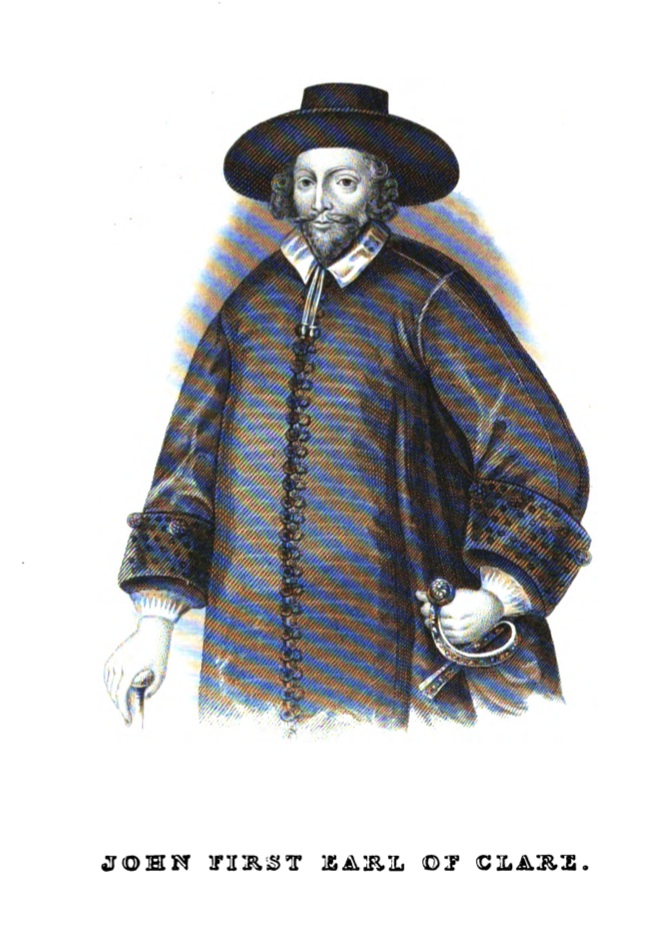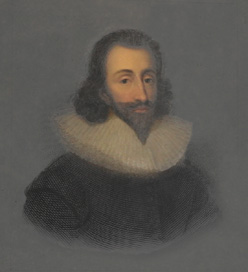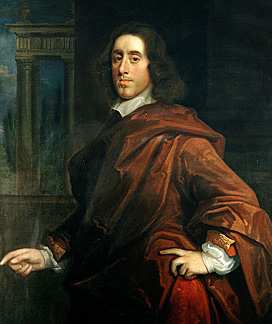|
Arthur Hesilrige
Sir Arthur Haselrig, 2nd Baronet (1601 – 7 January 1661) was a leader of the Parliamentary opposition to Charles I and one of the Five Members whose attempted arrest sparked the 1642–1646 First English Civil War. He held various military and political posts during the 1639–1651 Wars of the Three Kingdoms but became an opponent of Oliver Cromwell during the Protectorate. In 1660, his actions inadvertently helped restore Charles II to the throne; unlike many senior Parliamentary leaders, his life was spared but he was confined to the Tower of London, where he died on 7 January 1661. Life Haselrig was the eldest son of Sir Thomas Hesilrige, 1st Baronet (alternative spellings "Heselrig" and "Haselrigge"), of Noseley Hall, Noseley, Leicestershire, and of Frances Gorges, daughter of Sir William Gorges, of Alderton, Northamptonshire. From an early age he imbibed strong puritanical principles and showed a special antagonism towards Archbishop Laud. Short and Long Parlia ... [...More Info...] [...Related Items...] OR: [Wikipedia] [Google] [Baidu] |
English Council Of State
The English Council of State, later also known as the Protector's Privy Council, was first appointed by the Rump Parliament on 14 February 1649 after the execution of King Charles I. Charles' execution on 30 January was delayed for several hours so that the House of Commons could pass an emergency bill to declare the representatives of the people, the House of Commons, as the source of all just power and to make it an offence to proclaim a new King. This in effect abolished the monarchy and the House of Lords. History The Council of State was appointed by Parliament on 14 and 15 February 1649, with further annual elections. The Council's duties were to act as the executive of the country's government in place of the King and the Privy Council. It was to direct domestic and foreign policy and to ensure the security of the English Commonwealth. Due to the disagreements between the New Model Army and the weakened Parliament, it was dominated by the Army. The Council held its fi ... [...More Info...] [...Related Items...] OR: [Wikipedia] [Google] [Baidu] |
Charles II Of England
Charles II (29 May 1630 – 6 February 1685) was King of Scotland from 1649 until 1651, and King of England, Scotland and Ireland from the 1660 Restoration of the monarchy until his death in 1685. Charles II was the eldest surviving child of Charles I of England, Scotland and Ireland and Henrietta Maria of France. After Charles I's execution at Whitehall on 30 January 1649, at the climax of the English Civil War, the Parliament of Scotland proclaimed Charles II king on 5 February 1649. But England entered the period known as the English Interregnum or the English Commonwealth, and the country was a de facto republic led by Oliver Cromwell. Cromwell defeated Charles II at the Battle of Worcester on 3 September 1651, and Charles fled to mainland Europe. Cromwell became virtual dictator of England, Scotland and Ireland. Charles spent the next nine years in exile in France, the Dutch Republic and the Spanish Netherlands. The political crisis that followed Cromwell's deat ... [...More Info...] [...Related Items...] OR: [Wikipedia] [Google] [Baidu] |
William Strode
William Strode (1598 – 9 September 1645) was an English politician who sat in the House of Commons variously between 1624 and 1645. He was one of the Five Members whose impeachment and attempted unconstitutional arrest by King Charles I in the House of Commons in 1642 sparked the Civil War, during which he fought on the Parliamentarian side. Origins Strode was the second son of Sir William Strode (d. 1637), MP, of Newnham, Plympton St Mary, Devon, by his first wife Mary Southcote, daughter of Thomas Southcote of Bovey Tracey in Devon. Education He was admitted as a student of the Inner Temple in 1614, matriculated at Exeter College, Oxford, in 1617, and took the degree of BA in 1619. Career In 1624, Strode was elected Member of Parliament for Bere Alston, and was re-elected MP for Bere Alston in 1625, 1626 and 1628. He opposed Charles I from the start, and took a leading part in the disorderly scene of 2 March 1629, when the speaker, Sir John Finch, was held down ... [...More Info...] [...Related Items...] OR: [Wikipedia] [Google] [Baidu] |
John Pym
John Pym (20 May 1584 – 8 December 1643) was an English politician, who helped establish the foundations of Parliamentary democracy. One of the Five Members whose attempted arrest in January 1642 sparked the First English Civil War, his use of procedure to outmanoeuvre opponents was unusual for the period and he was respected by contemporaries rather than admired. In 1895, the political historian Goldwin Smith described him as "the greatest member of Parliament that ever lived". His father died when he was seven months old, and Pym was brought up by his stepfather Sir Anthony Rous, inheriting his Puritan views and deep opposition to the reforms of Archbishop William Laud. He was also a leading member of the Providence Island Company, an attempt to establish a Puritan colony in Central America. Described as 'a true revolutionary', he led the opposition to arbitrary rule under first James I, then Charles I. His leadership in the early stages of the war was essential to the ... [...More Info...] [...Related Items...] OR: [Wikipedia] [Google] [Baidu] |
Denzil Holles, 1st Baron Holles
Denzil Holles, 1st Baron Holles PC (31 October 1598 – 17 February 1680) was an English statesman, best remembered as one of the Five Members whose attempted arrest by Charles I in January 1642 sparked the First English Civil War. When fighting began in August, Holles raised a Parliamentarian regiment which fought at Edgehill before it was nearly destroyed at Brentford in November 1642. This marked the end of Holles' military career and he became leader of the Parliamentarian 'Peace Party', those who favoured a negotiated settlement with the king. A social conservative from a wealthy family, he came to see political radicals like the Levellers and religious Independents like Oliver Cromwell as more dangerous than the Royalists. Following victory in the First English Civil War, he led those who opposed Cromwell and his supporters, and was one of the Eleven Members suspended in June 1647. Recalled prior to the Second English Civil War in June 1648, he was excluded again b ... [...More Info...] [...Related Items...] OR: [Wikipedia] [Google] [Baidu] |
John Hampden
John Hampden (24 June 1643) was an English landowner and politician whose opposition to arbitrary taxes imposed by Charles I made him a national figure. An ally of Parliamentarian leader John Pym, and cousin to Oliver Cromwell, he was one of the Five Members whose attempted arrest in January 1642 sparked the First English Civil War. After war began in August 1642, Hampden raised an infantry regiment, and died of wounds received at the Battle of Chalgrove Field on 18 June 1643. His loss was considered a serious blow, largely because he was one of the few Parliamentary leaders able to hold the different factions together. However, his early death also meant he avoided the bitter internal debates later in the war, the execution of Charles I in 1649, and establishment of The Protectorate. This makes him a less complex figure than Cromwell or Pym, a key factor in why his statue was erected in the Palace of Westminster to represent the Parliamentarian cause in 1841. A reputation ... [...More Info...] [...Related Items...] OR: [Wikipedia] [Google] [Baidu] |
Root And Branch Bill
The Root and Branch Petition was a petition presented to the Long Parliament on December 11, 1640. The petition had been signed by 15,000 Londoners and was presented to the English Parliament by a crowd of 1,500. The petition called on Parliament to abolish episcopacy from the 'roots' and in all its 'branches'. Debate When the petition was debated in the House of Commons, the call for radical reforms in the Church of England was supported by Henry Vane and Nathaniel Fiennes, among others. Vane came to the front of the anti-episcopal faction, claiming that episcopacy was a corrupt doctrine "hastening us back again to Rome", while Fiennes argued that the episcopacy constituted a political and religious danger to English society. The House of Commons was reluctant to act on the Root and Branch Petition, though it did ultimately refer the petition to committee in February 1641, with Vane and Fiennes being added to the committee. This petition formed the basis of the Root and Bran ... [...More Info...] [...Related Items...] OR: [Wikipedia] [Google] [Baidu] |
Thomas Wentworth, Earl Of Strafford
Thomas Wentworth, 1st Earl of Strafford, (13 April 1593 ( N.S.)12 May 1641), was an English statesman and a major figure in the period leading up to the English Civil War. He served in Parliament and was a supporter of King Charles I. From 1632 to 1640 he was Lord Deputy of Ireland, where he established a strong authoritarian rule. Recalled to England, he became a leading advisor to the King, attempting to strengthen the royal position against Parliament. When Parliament condemned Lord Strafford to death, Charles reluctantly signed the death warrant and Strafford was executed. He had been advanced several times in the Peerage of England during his career, being created 1st Baron Wentworth in 1628, 1st Viscount Wentworth in 1629, and, finally, 1st Earl of Strafford in January 1640. He was known as Sir Thomas Wentworth, 2nd Baronet, between 1614 and 1628. Early life Wentworth was born in London. He was the son of Sir William Wentworth, 1st Baronet, of Wentworth Woodhouse, ne ... [...More Info...] [...Related Items...] OR: [Wikipedia] [Google] [Baidu] |
Act Of Attainder
A bill of attainder (also known as an act of attainder or writ of attainder or bill of penalties) is an act of a legislature declaring a person, or a group of people, guilty of some crime, and punishing them, often without a trial. As with attainder resulting from the normal judicial process, the effect of such a bill is to nullify the targeted person's civil rights, most notably the right to own property (and thus pass it on to heirs), the right to a title of nobility, and, in at least the original usage, the right to life itself. In the history of England, the word "attainder" refers to people who were declared "attainted", meaning that their civil rights were nullified: they could no longer own property or pass property to their family by will or testament. Attainted people would normally be punished by judicial execution, with the property left behind escheated to the Crown or lord rather than being inherited by family. The first use of a bill of attainder was in 1321 agains ... [...More Info...] [...Related Items...] OR: [Wikipedia] [Google] [Baidu] |
Long Parliament
The Long Parliament was an English Parliament which lasted from 1640 until 1660. It followed the fiasco of the Short Parliament, which had convened for only three weeks during the spring of 1640 after an 11-year parliamentary absence. In September 1640, King Charles I issued writs summoning a parliament to convene on 3 November 1640.This article uses the Julian calendar with the start of year adjusted to 1 January – for a more detailed explanation, see old style and new style dates: differences between the start of the year. He intended it to pass financial bills, a step made necessary by the costs of the Bishops' Wars in Scotland. The Long Parliament received its name from the fact that, by Act of Parliament, it stipulated it could be dissolved only with agreement of the members; and those members did not agree to its dissolution until 16 March 1660, after the English Civil War and near the close of the Interregnum.. The parliament sat from 1640 until 1648, when it was pu ... [...More Info...] [...Related Items...] OR: [Wikipedia] [Google] [Baidu] |
Short Parliament
The Short Parliament was a Parliament of England that was summoned by King Charles I of England on the 20th of February 1640 and sat from 13th of April to the 5th of May 1640. It was so called because of its short life of only three weeks. After 11 years of attempting Personal Rule between 1629 and 1640, Charles recalled Parliament in 1640 on the advice of Lord Wentworth, recently created Earl of Strafford, primarily to obtain money to finance his military struggle with Scotland in the Bishops' Wars. However, like its predecessors, the new parliament had more interest in redressing perceived grievances occasioned by the royal administration than in voting the King funds to pursue his war against the Scottish Covenanters. John Pym, MP for Tavistock, quickly emerged as a major figure in debate; his long speech on 17 April expressed the refusal of the House of Commons to vote subsidies unless royal abuses were addressed. John Hampden, in contrast, was persuasive in private: he ... [...More Info...] [...Related Items...] OR: [Wikipedia] [Google] [Baidu] |
William Laud
William Laud (; 7 October 1573 – 10 January 1645) was a bishop in the Church of England. Appointed Archbishop of Canterbury by Charles I in 1633, Laud was a key advocate of Charles I's religious reforms, he was arrested by Parliament in 1640 and executed towards the end of the First English Civil War in January 1645. A firm believer in episcopalianism, or rule by bishops, "Laudianism" refers to liturgical practices designed to enforce uniformity within the Church of England, as outlined by Charles. Often highly ritualistic, these were precursors to what are now known as high church views. In theology, Laud was accused of Arminianism, favouring doctrines of the historic church prior to the Reformation and defending the continuity of the English Church with the primitive and medieval church, and opposing Calvinism. On all three grounds, he was regarded by Puritan clerics and laymen as a formidable and dangerous opponent. His use of the Star Chamber to persecute opponents ... [...More Info...] [...Related Items...] OR: [Wikipedia] [Google] [Baidu] |








